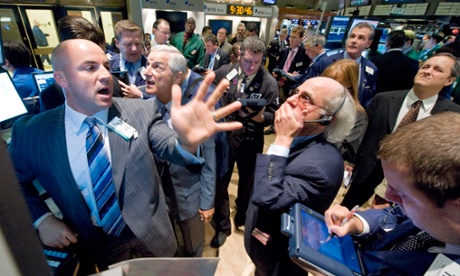The US stock market gets all the attention, but the bond market is where the real fortunes are made. Chris Arnade, a former bond trader, describes the unsmiling, powerful markets that move companies and governments
On Wall Street, nearly everybody trades either stocks or bonds. Stock traders are the smiling guys with short hair, button-up blue Brooks Brother shirts, and dark navy pinstripe suits. Bond traders are the same guys, only without the smile.
Stocks do well when the world is doing well and bonds mostly do well when things are going badly. This makes bond traders widely disliked. It is not cool to smile when things are going badly for everyone else.
I traded bonds for 20 years. During that time, countless friends, relatives, friends of relatives, drunk strangers and strange drunks asked me: “What stock should I buy?”
Nobody asked me about bonds. Maybe I should have smiled more.
Stocks seem easy. They are a single price that tells a story on how a company is doing: Apple at $100? Great! Bank of America at $15? Not so hot.
Bonds don’t seem easy. They have a yield, they have price, they have maturity, and they have a coupon. There are government bonds, there are corporate bonds, there are bonds issued by cities. Bonds are individual contracts to pay back a debt. They have a lot of moving parts.
Stocks are how you make money and bonds are how you borrow money. Everybody likes making money, nobody likes borrowing money.

http://www.theguardian.com/business/2014/nov/03/bond-market-matters-talking-stocks
Related Posts
- 67If the insatiable demand for bonds has upended the models you use to value them, you’re not alone. Just last month, researchers at the Federal Reserve Bank of New York retooled a gauge of relative yields on Treasuries, casting aside three decades of data that incorporated estimates for market rates from professional…
- 52U.S. Treasury yields and other interest rates increased in the months leading up to the Federal Reserve’s December 2013 decision to cut back its large-scale bond purchases. This increase in rates probably at least partly reflected changes in what bond investors expected regarding future monetary policy. Recent research on this…
- 50The world’s major currencies, which had traded in a relatively stable range, are now in motion -- buffeted by different regional growth and interest rates as well as a simmering brew of geopolitical tensions. Differences are particularly noticeable between the U.S. and Europe, and how far apart currencies in those…
- 49The European Central Bank announced some measures to ease monetary policy two weeks ago. The euro had been on a downtrend since May and by these measures the ECB increased its support to the economy. The result? Two weeks later, EUR/USD stabilized just above 1.35. This week’s Eurozone economic calendar…
- 47http://www.bankofengland.co.uk/publications/Documents/speeches/2017/speech986.pdf https://www.bloomberg.com/news/articles/2017-06-28/draghi-s-prudence-warning-confirmed-by-reaction-to-his-own-words